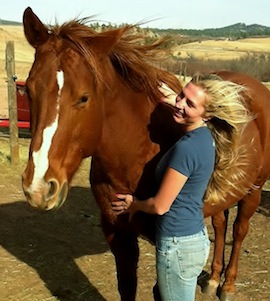
Equine Assisted Therapy has been used to treat addiction for years, and horses are increasingly being incorporated into treatment by eating disorder programs across the country. Under the supervision of a mental health professional, and often in conjunction with evidence-based approaches such as CBT and DBT, working with horses can help patients feel more comfortable with their bodies, as well as help them hone life skills. “Anxiety, emotional regulation, trust, and body image are all core issues in eating disorder clients,” Mark Hobbins, executive vice president of Center for Discovery, an eating disorders treatment center in Bellevue, Washington, tells The Fix. “Working with large animals requires physical movement and body awareness, and provides an opportunity for clients to find empowerment and enjoy an experience in their bodies.” At Discovery, patients are taught to care for the horses by feeding, grooming, and cleaning them. Hobbins explains that these kinds of “experiential therapies” can help “provide insight into subconscious experiences and help clients step away from thinking and step into feeling.”
Horses are also “great teachers of assertive communication and setting boundaries,” Cheryl Musick, an Advanced Certified EAGALA (Equine Assisted Growth and Learning Association) group specialist at Rosewood Ranch Eating Disorder Treatment Center tells us. “People must learn to be assertive to lead the horse around, [or else they] will be dragged around by it.” Musick has been working in horse therapy for years and is “in awe” of what it can accomplish, such as helping patients overcome fear in the face of a thousand-pound animal. According to Musick, “Equine therapy helps clients address fear [around past] trauma, or even [of] a plate of food. It allows them to dig deeper and realize that it’s not frightening at all.” Although working with the creatures can be scary at first, the horses ultimately inject a large dose of levity into the healing process. When the animals hear the “call of nature” and clients react with disgust, Musick will jokingly ask them, “Are you jealous?” (Eating disorders often impact the digestive system’s “organic” processes). She says her patients will respond with laughter—sometimes the best medicine.
